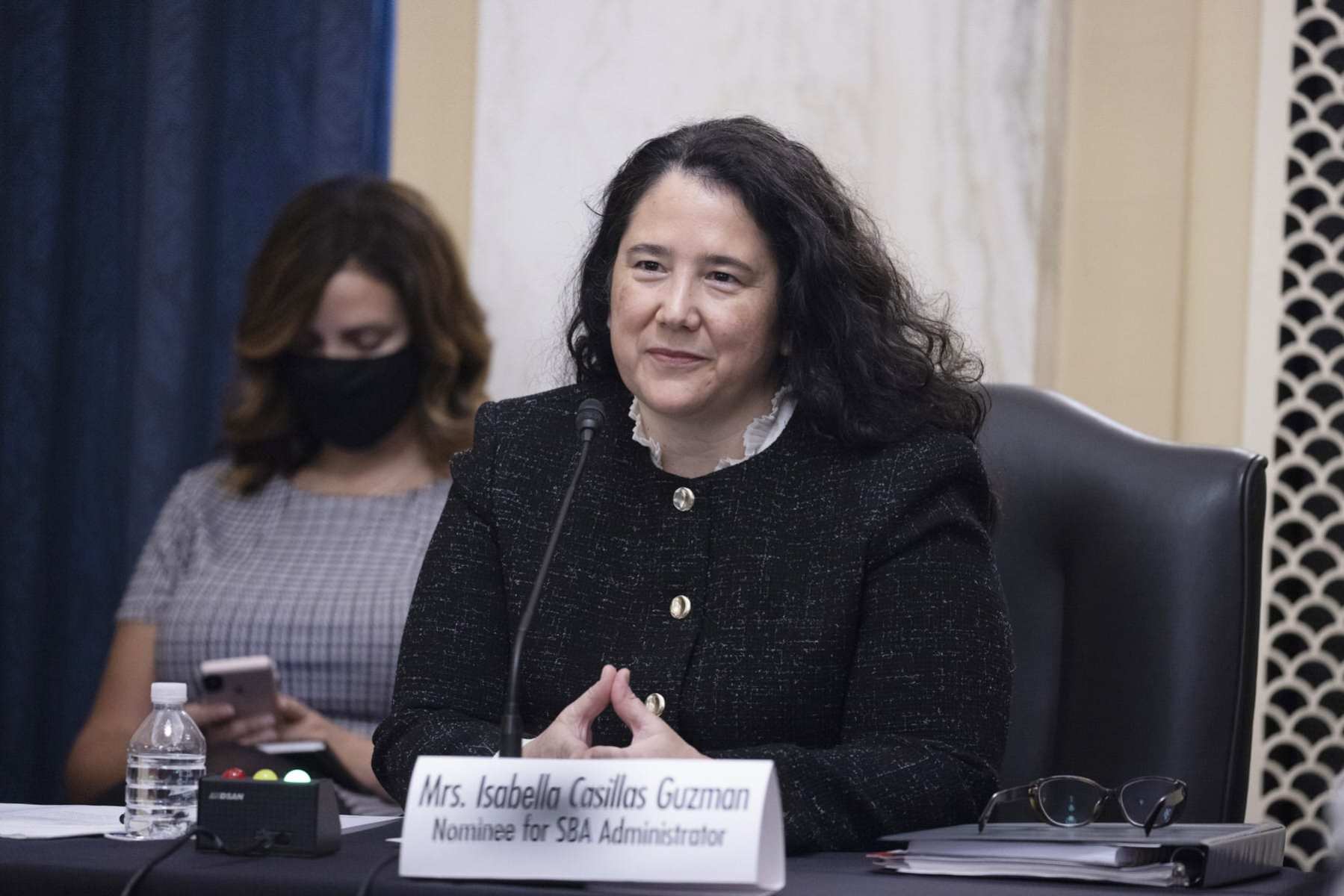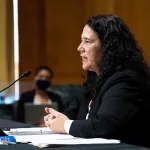When it comes to the nation’s economic recovery from the coronavirus pandemic, Isabella Casillas Guzman has arguably one of the most important Cabinet roles in President Joe Biden’s administration.
The new administrator of the Small Business Administration, Guzman is helping to lead efforts to distribute billions of dollars to small businesses that have been affected by COVID-19. And Guzman has entered the role — she was sworn in March 17 — just as Congress approved a $1.9 trillion relief package aimed at helping various facets of American life.
This isn’t new territory for Guzman, who worked at SBA during the Obama administration as deputy chief of staff and senior adviser. She most recently worked as director of the California Office of the Small Business Advocate.
Now back at the SBA, Guzman will help oversee the distribution of several pots of money from the American Rescue Plan, including more than $28 billion for a restaurant grant program, more than $100 million for a “community navigator” program to reach out to small businesses, $15 billion for the the Economic Injury Disaster Loan program and $7.25 billion for the Paycheck Protection Program (PPP) to help businesses recovering from the pandemic.
Earlier this week, the SBA announced it would triple the maximum amount that small businesses and nonprofits can borrow under the Economic Injury Disaster Loans program.
“We are heartened by the resources that were part of the $1.9 trillion American Rescue Plan and know that we can have additional tools outside of SBA’s core portfolio to support our small businesses,” Guzman said in a Thursday interview with The 19th.
Guzman said she recognizes the higher barriers for women and people of color to access the needed resources as small-business owners. When asked about available data on the racial and ethnic diversity of the PPP program, Guzman noted that applicants aren’t required to share such data, but it’s now encouraged. Her staff claims the percentage of loans going to businesses with fewer than 20 employees is up, as well as to businesses with fewer than five employees and to “sole proprietors” of businesses who are disproportionately likely to be women and minorities.
This interview has been edited for length and clarity.
You were confirmed as SBA administrator just a little over a week ago, and you’ve already joined a virtual panel of women who run small businesses. Why the focus on women business owners?
Well in recent years we’ve seen a growing rate of entrepreneurship across our women founders, and I think they clearly are powering our economy, building wealth for their families and their communities, and yet they still have challenges accessing resources. And so it’s a priority in order to make sure that we build back better and that we’re able to regrow, rebuild our economy, that we focus on all of our entrepreneurs. And so, especially considering these historic barriers, we need to focus where our emerging entrepreneurs are coming from and make sure that as we build the SBA back as well that we focus on equitable access to resources.
The last year has been difficult for small businesses because of the coronavirus pandemic, so there is a spotlight on the Small Business Administration. Emerging data on the effects of the pandemic on businesses shows disproportionate losses for women and people of color. How do you plan to prioritize them?
It’s part of an essential element of all my work in the past and will continue to be at the SBA. We know that women and people of color are driving entrepreneurship, and yet they have been suffering disproportionately during COVID and in most of these cases, through no fault of their own, just effects of the pandemic and COVID. And so we really need to ensure that we are focusing on building businesses back and helping small businesses create the jobs that they’re so good at building for our economy, and ensuring that there’s an equitable access to resources across the board. And so focusing on our customers, focusing on who is representative of the small-business community and making sure that we have the touch points, that we’re implementing these programs through our incredible network of resource partners and field offices as well as other stakeholders and strategic partners, so that we can effectively reach our customers and continue to establish collaboration and partnership to serve them well during this time.
There’s also a complexity in helping small businesses in terms of federal relief. What’s your top priority?
Immediate relief is really critical. Because businesses have been devastated. The cash flows have disappeared or shrunk completely. Their markets have been impacted, and so focusing on providing access to capital, whether it’s relief grants or loans or assistance on the fundraising side, that’s really important. But as well, the access to market, which is the revenue side of the equation, which is really critical and can also level the playing field for businesses out there. And so making sure that we’re focusing on our contracting programs and connecting small businesses to the federal marketplace and supply chains broadly and connecting them to e-commerce and global trade and beyond is really important. And then, finally, access to networks. I think we need to better leverage and collaborate and cooperate to make sure that our local ecosystems are strong and that small businesses are able to connect to all of these resources.
The new $1.9 trillion COVID-19 relief package includes funds for the Paycheck Protection Program (PPP) program. How do you plan to distribute those funds?
I think that it’s very important that we ensure that the PPP gets into the hands of those highly impacted businesses. President Biden has prioritized the smallest mom and pop shops that were often left behind in the first round and in the beginning of PPP. So really trying to focus on ensuring outreach and connection and that our lending partners, which have been so critical in implementing this program, can help us achieve equity in the distribution of funds. And I know we definitely want to make sure that we also focus on the other side of it, which is the forgiveness part. Obviously small businesses have been through quite a bit so we’re continually working to ensure that there’s a simple and streamlined process for forgiveness to borrowers and ensuring that they’re able to process their application with that customer centric focus that I talked about earlier.
Agriculture Secretary Tom Vilsack said recently that only 0.1 percent of the Trump administration’s COVID farm relief went to Black farmers. What is the racial/ethic diversity of the PPP program?
We know that across our programs we need to do better when it comes to access and equitable access, especially for people of color who have not been able to access these programs based on numerous studies, externally in the community, and so you know I’m committed to constantly looking at any policy shifts or any changes in our programs, relief and beyond to ensure that we can better reach these communities that are hard hit, and which are starting businesses at higher rates.
Just one more point on that question. I’m trying to understand if the data exists, or do you feel like it’s comprehensive?
It’s challenging because it is an optional data field that wasn’t collected initially, and it’s an optional data field still. And while it’s more prominent now into the Biden administration, there’s obviously still gaps in data so we can’t truly know. … While the data is perhaps not comprehensive, we definitely know that there’s been gaps based on external research, and what we’ve been hearing from our partners on the ground, and so we’ll continue to try to prioritize.
The pandemic has exacerbated inequities around issues like paid family leave and child care in the workforce. Does the SBA play a role in addressing those issues?
I think definitely child care, as we’ve seen so many entrepreneurs balance both taking care of their kids during this pandemic as well as running their businesses. Obviously it’s been a heightened challenge for women. SBA does provide capital and training to child care providers. And so there are some unique programs around the country through our small business development centers for example, where they specifically train child care providers on the basics of running the business, and so I think that that effort is going to have to increase to ensure that we have adequate child care throughout the country for our small-business owners and entrepreneurs.
What do you view as the biggest challenge to your work?
Small businesses are very resilient and tenacious, and I think that they fuel and really inspire my work on an ongoing basis. I think the challenge is there’s so much to do with limited time and resources, and we know that small businesses are hurting now and need immediate relief. And so what will always be my focus and what keeps me up at night is the time that we turn things around and really support our small businesses during the pandemic, to ensure they’re able to survive and eventually thrive.






